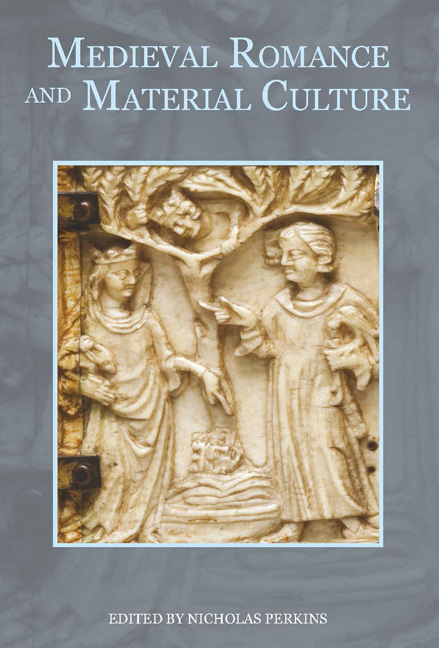Book contents
- Frontmatter
- Contents
- List of Illustrations
- List of Contributors
- Acknowledgements
- Abbreviations
- 1 Introduction: The Materiality of Medieval Romance and The Erle of Tolous
- 2 Courtly Culture and Emotional Intelligence in the Romance of Horn
- 3 Emplaced Reading, or Towards a Spatial Hermeneutic for Medieval Romance
- 4 Devotional Objects, Saracen Spaces and Miracles in Two Matter of France Romances
- 5 The Werewolf of Wicklow: Shapeshifting and Colonial Identity in the Lai de Melion
- 6 ‘Ladyes war at thare avowing’: The Female Gaze in Late-Medieval Scottish Romance
- 7 The Evolution of Cooperation in The Avowyng of Arthur
- 8 Ritual, Revenge and the Politics of Chess in Medieval Romance
- 9 Adventures in the Bob-and-Wheel Tradition: Narratives and Manuscripts
- 10 Reading King Robert of Sicily's Text(s) and Manuscript Context(s)
- 11 The Circulation of Romances from England in Late-Medieval Ireland
- 12 The Image of the Knightly Harper: Symbolism and Resonance
- 13 Carving the Folie Tristan: Ivory Caskets as Material Evidence of Textual History
- 14 Romancing the Orient: The Roman d'Alexandre and Marco Polo's Livre du grand Khan in Oxford, Bodleian Library MS Bodl. 264
- 15 The Victorian Afterlife of The Thornton Romances
- Index
9 - Adventures in the Bob-and-Wheel Tradition: Narratives and Manuscripts
Published online by Cambridge University Press: 05 May 2015
- Frontmatter
- Contents
- List of Illustrations
- List of Contributors
- Acknowledgements
- Abbreviations
- 1 Introduction: The Materiality of Medieval Romance and The Erle of Tolous
- 2 Courtly Culture and Emotional Intelligence in the Romance of Horn
- 3 Emplaced Reading, or Towards a Spatial Hermeneutic for Medieval Romance
- 4 Devotional Objects, Saracen Spaces and Miracles in Two Matter of France Romances
- 5 The Werewolf of Wicklow: Shapeshifting and Colonial Identity in the Lai de Melion
- 6 ‘Ladyes war at thare avowing’: The Female Gaze in Late-Medieval Scottish Romance
- 7 The Evolution of Cooperation in The Avowyng of Arthur
- 8 Ritual, Revenge and the Politics of Chess in Medieval Romance
- 9 Adventures in the Bob-and-Wheel Tradition: Narratives and Manuscripts
- 10 Reading King Robert of Sicily's Text(s) and Manuscript Context(s)
- 11 The Circulation of Romances from England in Late-Medieval Ireland
- 12 The Image of the Knightly Harper: Symbolism and Resonance
- 13 Carving the Folie Tristan: Ivory Caskets as Material Evidence of Textual History
- 14 Romancing the Orient: The Roman d'Alexandre and Marco Polo's Livre du grand Khan in Oxford, Bodleian Library MS Bodl. 264
- 15 The Victorian Afterlife of The Thornton Romances
- Index
Summary
In his annotated bibliography English Versification, 1570–1980, Terry V.F. Brogan delivered a damning verdict on the discipline of Middle English:
In comparison with the study of OE verse, which is a discipline relatively coherent in its terms and its methods, our understanding of ME verse is far less advanced. One wonders why those departments charged with the study of the English language and its poetry have allowed this situation to persist […] Much work needs to be done. The study of ME verse may be as much as a century behind that of Old English.
Since this was written, certain areas of Middle English (I think especially of alliterative metre) are no longer so far behind, but it is surely still true that ‘[m]uch more work needs to be done’, perhaps especially by those of us working on Middle English romances, which present us with an impressive variety of verse forms. Leaving aside the more familiar forms—the rhyming couplets and tail-rhyme, each itself encompassing diverse species —we find the following:
• aaabab stanza (Octavian, Southern Version)
• abab stanza (e.g. Sowdon of Babylon, Apollonius of Tyre fragment)
• septenaries with medial and end rhyme (Ashmole Sir Ferumbras)
• abababab stanza (Stanzaic Morte Arthur and prologue to Thomas of Erceldoune)
• abababab+cbc stanza (Sir Tristrem) [+ indicates that the stanza ends in a wheel]
• abababab+cdddc stanza (e.g. Awntyrs off Arthure)
• alliterative long lines (e.g. Wars of Alexander, Alliterative Morte Arthure)
• stanza consisting of alliterative long lines+ababa (Sir Gawain and the Green Knight)
• the rhyme-royal stanza (e.g. Generides, Trinity College Cambridge MS)
In reality, the variety is greater still, for this is a simplified classification which largely ignores not only rhythmical distinctions but also variations of stanza forms within some of the romances mentioned. For example, the Ashmole Sir Ferumbras shifts from septenaries to tail-rhyme at line 3411, 4 and Sir Tristrem, as it stands in the Auchinleck manuscript, also has stanzas rhyming abababab+cac (stanzas beginning at lines 34, 67, 78, 244, 1178, 2168), along with various anomalous stanza forms which are probably scribal in origin.
- Type
- Chapter
- Information
- Medieval Romance and Material Culture , pp. 147 - 164Publisher: Boydell & BrewerPrint publication year: 2015



